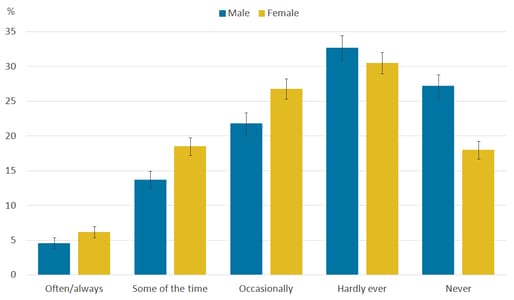Loneliness Test
3 Min Free Loneliness Test
Who Can Benefit From This Loneliness Test?
A loneliness test can benefit individuals who are experiencing feelings of loneliness and social isolation. These feelings may be caused by a variety of factors, including changes in life circumstances, such as moving to a new place or losing a loved one, social anxiety, and mental health conditions such as depression.
The loneliness test can help individuals determine the severity of their loneliness and identify potential contributing factors. It can also provide valuable information for healthcare professionals to make a diagnosis and develop a treatment plan.
People who have a history of social isolation, have experienced significant stress or trauma, or have a mental health condition that may be contributing to their loneliness may also benefit from a loneliness test.

Loneliness Test Accuracy

The accuracy of a loneliness test can vary depending on the type of test used and the experience and qualifications of the healthcare professional conducting the test.
Loneliness tests typically involve a comprehensive evaluation of the individual’s symptoms and behavior, including clinical interviews, self-report measures, and psychological tests. By using multiple sources of information, a more accurate and comprehensive assessment can be obtained.
It is important that the healthcare professional conducting the loneliness test has experience and expertise in diagnosing and treating loneliness and related conditions. They should be familiar with the diagnostic criteria and able to differentiate between loneliness and other conditions that may present with similar symptoms.
Types of Loneliness Test
Clinical interviews:
A healthcare professional will conduct a comprehensive interview with the individual to gather information about their symptoms, history, and behavior.
Self-report measures:
These are standardized questionnaires that ask individuals to report their feelings of loneliness and social isolation. Examples of self-report measures used for loneliness include the UCLA Loneliness Scale and the De Jong Gierveld Loneliness Scale.
Clinician-administered scales:
These are rating scales completed by a healthcare professional to assess the severity of an individual’s symptoms. Examples of clinician-administered scales used for loneliness include the Loneliness and Social Dissatisfaction Scale and the Social and Emotional Loneliness Scale for Adults.
Behavioral observations:
A healthcare professional may observe the individual in different social settings to assess their behavior and symptoms.
Psychological tests:
These tests are used to assess cognitive abilities, attention, and other aspects of the individual’s functioning. Examples of tests used for loneliness include the Beck Depression Inventory and the State-Trait Anxiety Inventory.
Medical tests:
This involves examining an individual’s social network, including the size, diversity, and quality of their relationships, to identify potential areas of social isolation.
Treating Loneliness
The treatment of loneliness typically involves a combination of psychotherapy, medication, and lifestyle changes. Treatment plans will be tailored to the individual’s needs and may vary based on the severity of symptoms and other factors.
- Psychotherapy: Psychotherapy, such as cognitive-behavioral therapy (CBT) or interpersonal therapy (IPT), can help individuals learn to manage their symptoms, develop healthy coping strategies, and address underlying psychological and emotional issues that may be contributing to their loneliness.
- Medication: Medications such as antidepressants may be used to help reduce symptoms of depression and anxiety that often co-occur with loneliness.
- Social skills training: Social skills training can help individuals with loneliness learn how to interact with others and develop healthy social relationships.
- Support groups: Joining a support group, either in-person or online, can provide individuals with loneliness a sense of community and connection with others who are experiencing similar challenges.
- Lifestyle changes: Lifestyle changes can also be helpful in managing symptoms of loneliness. Regular exercise, a healthy diet, and good sleep habits can all contribute to better overall health and may help reduce symptoms of loneliness.

